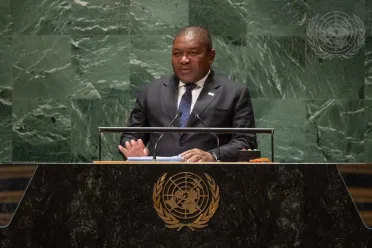Statement
Statement summary
FILIPE JACINTO NYUSI, President of Mozambique, noted that the main reason for the lack of success of the 2030 Agenda for Sustainable Development “remains the absence of trust and solidarity between those who have a lot and those who have little or almost nothing at all”. On the issue of peace and security, he noted several regions, particularly Africa, are grappling with armed conflicts and instability. The number of refugees and internally displaced persons has increased more than 50 per cent in the past year alone. Mozambique has experienced cycles of armed conflicts, sometimes triggered by forces alien to national interests; however, through constructive dialogue founded on trust, the country signed the Peace and Reconciliation Accord, also known as the Maputo Accord. In June, the country closed the last Mozambican National Resistance (RENAMO) camp, a formerly armed opposition party, with the next phase being the reintegration of ex-combatants into society.
He expressed concern that Mozambique is confronted by the nefarious phenomenon of terrorism, specifically in Cabo Delgado Province in the north. Its strategy focuses on strengthening combat operations by the Mozambican Defence and Security Forces, with the initial support of the Rwandan contingent and the Southern African Development Community (SADC) multilateral force. He further cited tangible success on the ground, though terrorists continue to sow fear in isolated villages. With improvements in safety, populations have been returning in large numbers to their home areas and resuming normal life — a pioneer experience of combining bilateral and multilateral interventions and an example of solving African problems first by Africans themselves. However, he noted the need for substantial support for those countries that are directly intervening in countering terrorism with Mozambique.
Warning that climate change is the main crisis facing mankind in this century, he emphasized the selfishness of the countries that pollute the most. Due to Mozambique’s geographic vulnerability, the country suffers cyclically, with the latest cyclones — Idai, Kenneth and Freddy — causing hundreds of lost lives and $2 billion in damages and losses. However, support from partners has been well below the pledges, and in many cases, partners have preferred to manage the funds outside agreed mechanisms with the Government, causing overlaps in areas or programmes which have little impact on the communities. Consequently, a substantial portion of the funds is spent on capacity-building and bureaucratic issues rather than allocating funds to those affected. Turning to the global imperative of energy transition, he called for it to work as a launchpad for poor countries. Mozambique is a regional reference for the diversity of its energy matrix, including hydropower dams and solar and wind power stations.
Mozambique, he recalled, also boasts robust environmental legislation, including in line with the Paris Agreement on climate change, and became the first African country to receive payments from the World Bank Fund to reduce emissions from deforestation and forest degradation. Last year, it launched a regional initiative on the “Sustainable Management of the Miombo Forest” that culminated in the adoption of the Maputo Declaration endorsed by 11 SADC member States. Miombo woodland is the world’s largest tropical forest ecosystem and can contribute to capturing carbon on the planet. “We don’t need to come up with analytical speeches,” he stressed, calling for vigorous action by all. He further appealed for a more inclusive international financial system that is guided by transparent rules, where Africa can participate as a partner with much to offer the world — not only as a warehouse that supplies cheap commodities to countries or international multinational corporations that dominate the international market.
In his address to the UN General Assembly on Tuesday, the president of Mozambique said that the main reason for lack of progress on the 2030 Agenda is similar lack of trust and solidarity “between those who have a lot and those who have little or almost nothing at all”.
Full statement
Read the full statement, in PDF format.
Photo

Previous sessions
Access the statements from previous sessions.
